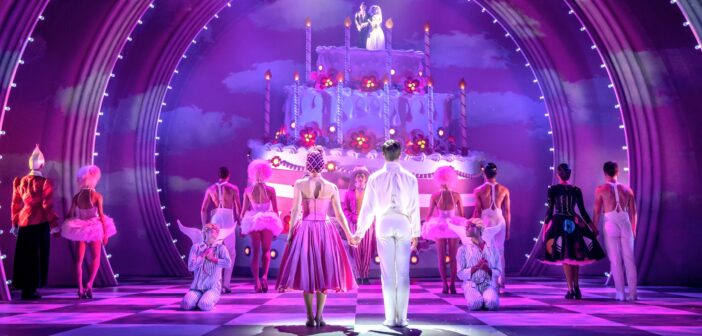Bourne is undoubtedly a master of his craft, but while Nutcracker makes itself a hit on occasion, it misses far too often to make it great.
“It’s just too busy, I don’t know who to watch.”
There’s two things wrong with Mathew Bourne’s Nutcracker: its franticness and occasionally, its design. For audiences who can overcome these issues, it’s no doubt sensational. However, this is a show designed very much to reward those familiar with the story and the ballet, and as someone who is familiar to neither, issues often glared- even to the untrained eye.
The story of Nutcracker is a tale as old as time. Set in a Dickensian-esque orphanage, Clara dreams of escape from Dr Dross, and his wife, the Matron. Terrorised and tormented by Dross’s children, Sugar and Fritz, when the Nutcracker comes to take Clara away to the world of “Sweetieland”, she becomes embroiled in an unrequited love story. She is whirled around until her eventual escape and happy ever after.
It’s saccharin-sweet, and the second-half of the Nutcracker unapologetically embraces that sweetness with an array of colourful costumes, dances, and plenty of licking – yes, you read that right. With characters like King Sherbert, The Gobstoppers, and Queen Candy, “Sweetieland” is just that- sweet- so sugar infused dances, chaotic energy, and tongue-wagging all make sense in this version of the Tchaikovsky classic. Although as much as it may be a simplification, it isn’t disloyal to Tchaikovsky. Bourne honours the composer in a way ballet never could in his own time; with a startling but beautifully homoerotic element to the ballet as sex and gender become intertwined in this performance. It was mesmerising in its execution, and well-worth the inclusion. It was never played for laughs or glossed over. It comes from a place of respect and admiration for the composer, that only Bourne could weave so convincingly into the ballet.
It’s only a shame that Bourne’s Nutracker, for all its respect and admiration, often faltered in its execution. As a performance that prizes the energy drawn from sugar, it wedges key story elements amongst the chaos of a busy stage. Too many times did the ballet falter. Imperfect synchronicity, especially at times of mirrored choreography or the sudden clunkiness of a mistake, throwing a dancer toward a wall – who then had to quickly pivot out of the way. The problem isn’t with Bourne’s principal dancers, but the ensemble, those that decorate the stage and constantly fight for their presence. Sadly, it seems like an oversight on Bourne’s behalf; focus on the story gets lost in the flourishes that are often more noticeable for the ensemble’s sheer size.
It only becomes more disheartening when the stage design looses its momentum. The orphanage with its warped perspective and greyscale colour palette felt to have more personality than the aforementioned “Sweetieland”, and no amount of dancing could distract from the shaky projector that constantly juddered with the movements.
To say all this is a shame because when Bourne gets it right, he really does get it right. Monique Jonas’s performance as Sugar is without a doubt a highlight of the show, her ballet flawless in execution, and her antagonism delightful to watch. Similarly, the Nutracker himself – Harrison Dowzell – was easily the most talented male dancer, his short solo a demonstration of ballet at its best. Yet these dances and dancers get lost in pull of busy onstage dancing, and that ultimately weakens the show because its moments of greatness are too far and few between. Even Tchaikovsky’s greatest piece, ‘The Waltz of the Flowers’ is turned into a gimmicky display of simplistic interactions that do the pieces emotional brevity and complexity a disservice. The ‘Russian Dance’ feels comparatively wasted in its simplicity, and Bourne’s choreography just constantly fails to show the restraint that’s needed during the ballets more emotional moments.
All that could be felt when the curtain finally rolled down was shame. At times the Nutcracker is great, when it’s not challenged by a ‘too many cooks’ situation. Its integration of different dance styles, a use of some great principal ballet dancers, and a beautiful Act 1 set design all quickly spirals in Act 2 – when the stage gets busy. The quote above is from a random audience member, and once I heard it, I couldn’t un-see the issue. In this case, that’s the real shame.



![Midge Ure on Legacy, Live Aid, and his upcoming ‘Catalogue’ tour: ‘The idea that there could be an [AI] Ultravox in 40/50 years from now is terrifying’](https://theedgesusu.co.uk/wp-content/uploads/2024/03/download-214x140.jpg)
